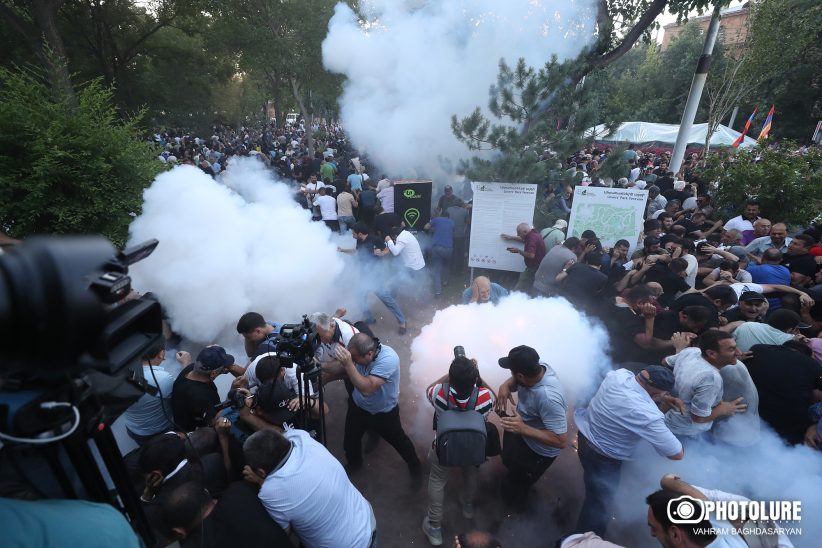2019 was unprecedented in terms of the number of court cases, involving journalists and the media. During the year, 96 new lawsuits were filed vis a vis 22 lawsuits in the previous year. The majority, 89 of them are on the grounds of insult and slander under Article 1087.1 of the RA Civil Code, 4 are violations of the right to information, 1 is an economic dispute, in one case the media outlet filed a lawsuit against a political scientist, and against the government in another.
This large influx of lawsuits is largely due to the fact that in the post-revolutionary Armenia the polarization of the media and their division into political and financial camps have become more intense , and as a result many media outlets have turned into outlets, serving the interests of their political sponsors and the public at large. This is coupled with the spread of fake news, deliberate distortion of facts, and misinformation, all of which prompts people of all walks of life to file a lawsuit against the media outlet in relation to the publications it contains.
The trend continued in 2019, when various officials, politicians, and others disrespected or discriminated against journalists performing their duties or displayed intolerance towards the media and their representatives. Prosperous Armenia Party leader Gagik Tsarukyan was particularly notable for such behavior, which caused repeated statements by 10 journalistic organizations. Such behavior was manifested also by President of the Constitutional Court Hrayr Tovmasyan, Prosperous Armenia Party MP Vardan Ghukasyan and others.
Unlike the revolutionary 2018, when there was a large number of physical violence against journalists, in 2019 the number of such cases dropped sharply. 4 cases were registered unlike 21 cases the previous year. But the number of various pressures on the media and their staff has doubled. The number reached 134 unlike the 67 cases the previous year. The rate of the violations of the right to receive and disseminate information has also increased. In 2019, it was 108 against 98 in 2018.
One of the significant processes of 2019 was the redistribution of ownership of media outlets, in particular television companies. This redistribution took place among the former authorities without the intervention of the new government. A notable example of this was the dismantling of PanArmenia Media Holding and the sale of mass media outlets to various companies whose founders, however, are associated with the former authorities or their representatives. In addition, the former H3 TV channel was also resold, which, after the first change of ownership, was broadcast as MoTV, and after the whole package was transferred to the former owners of Armenia TV, namely, the Sargsyan brothers, it was renamed New Armenia.
During the period under review, a number of bills put into circulation by the Government raised the concern of the journalistic community. Besides being highly contentious in terms of the ideas and concepts therein, the process of developing and submitting these documents without the involvement of and discussions with the civil society stakeholders caused additional dissatisfaction. Among such documents was, for example, the draft law on amending the RA Law on Freedom of Information, developed by the Ministry of Environment, which was posted on the official e-draft.am website and attempted to limit environmental information on unacceptable grounds.
The law on making amendments to the RA Law on Television and Radio, submitted by the Ministry of Justice, is also of great concern. Here, among other things, it is envisaged to allow the Public TV Company to broadcast up to 5 minutes of advertising per hour. However, according to the current law, the state-funded Public Television and Radio Company does not have a right to broadcast advertising. In this regard, 10 journalistic organizations made a joint statement on December 13, 2019, stating that the proposed amendment was an unjustified step and was not conditioned by public demand.
Notable among the legislative processes related to freedom of information and media activity was the adoption of the draft law on Making Amendments to the RA Law on Local Self-Government in the City of Yerevanon September 10, 2019. The draft law was developed by the Committee to Protect Freedom of Expression and was put into circulation by the National Assembly Bright Armenia faction. Accordingly, the unreasonable restrictions applied by the previous authorities on media activity in the municipality were removed, and it was legally stipulated that journalists could access the municipality building as necessary, attend council meetings and cover them freely.
Although in the post-revolutionary period, the media have been free from the interference and control of the new government, they remain under the influence of various political forces. In this regard, the issue of transparency of media ownership and funding in general is an imperative, which was also addressed by the Prime Minister during the pre-New Year reception for media representatives at the end of the year. This issue can be regulated by legislative changes. Specifically, mechanisms for ensuring transparency of ownership in broadcasting sector have been proposed in the new draft law on Television and Radio, developed by three journalistic organizations: the Committee to Protect Freedom of Expression, Yerevan Press Club and Media Initiatives Center. This draft law has been in the National Assembly since July.
One of the noteworthy events at the end of 2019 was that A1 + TV applied to the RA Administrative Court demanding to annul the acts adopted in 2003 and still in force, which violated the right of the TV station to broadcast.
In 2019, the Committee to Protect Freedom of Expression continued to monitor the progress the criminal cases initiated in connection with the events of Electric Yerevan (June 23, 2015) and Sari Tagh (July 17 to 30, 2016) in which more than 40 journalists and cameramen were identified as victims. Success was achieved (also with the efforts of the CPFE) in overturning the decision of the Special Investigation Service on suspending the case of Sari Tagh by court proceedings, and the investigation got reopened, however, the appeal of the same decision by the SIS regarding Electric Yerevan is still pending in court.
In total, there were 246 reported violations of the rights of journalists and the media in 2019. 4 of them are cases of physical violence, 134 cases of pressure against the media and their employees, 108 cases of violations of the right to receive and disseminate information.








